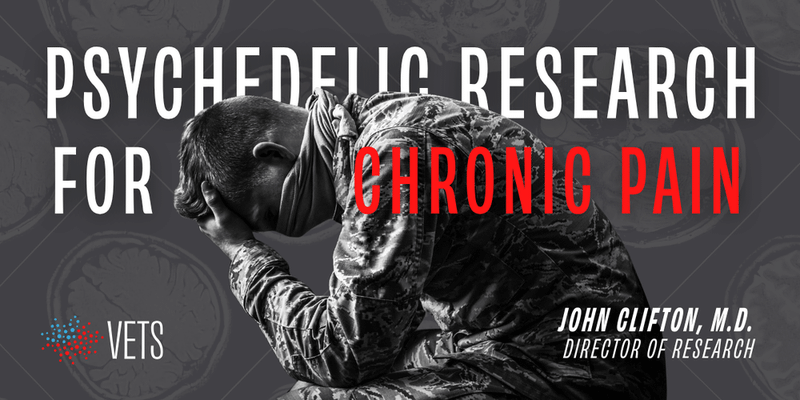When people talk about psychedelic therapy, most of the attention tends to focus on its potential to alleviate mental health conditions like depression, anxiety, or PTSD. And for good reason: these are some of the most urgent issues facing our veteran community, and we’ve seen promising clinical outcomes.
But what if these same substances could also help ease physical suffering?
The Overlooked Epidemic: Chronic Pain in Veterans
Chronic pain is consistently the leading cause of disability worldwide . In the U.S. alone, over 60 million people live with persistent pain. Veterans are even more likely to suffer from chronic pain, with one study showing that more than 50% of veterans receiving care through the VA report pain on a regular basis, and nearly two-thirds of those experience it daily.
This is more than just a medical issue… it’s a quality of life crisis. Chronic pain can take a serious toll on a person’s mental health as daily functioning becomes nearly impossible, relationships become strained, and one’s sense of hope and optimism for any sense of a pain free life is thrown into question. It’s no surprise that many veterans with chronic pain also struggle with depression, anxiety, substance use, or even suicidal ideation.
Current treatments involving opioids, physical therapies, NSAIDS, injections, or surgeries, can come with major side effects (including worsening pain!) and limited long-term relief. That’s why new approaches are urgently needed.
Psychedelics and the Brain-Body Connection
We’re beginning to learn that psychedelic therapy might be one of these new approaches — offering not just psychological healing, but potentially helping to reduce chronic pain , cluster headaches , and other hard-to-treat physical symptoms. This area of research is still in its early stages, but it’s growing fast and may just reshape how we think about pain and the brain-body connection.
Recent clinical trials in the U.S. and abroad are beginning to explore how psychedelic assisted therapy might help relieve physical symptoms. Research teams in places like The Netherlands , San Diego , Baltimore , San Francisco , Atlanta , and Birmingham are running small but meaningful studies investigating the use of psilocybin, LSD, MDMA, and other compounds for a variety of chronic pain conditions, including migraines, fibromyalgia, and phantom limb pain.
While these studies are still emerging, early results suggest that certain psychedelic therapies may help reduce pain intensity, improve daily function, sense of agency, and address additional layers of emotional pain and suffering.
This is profoundly interesting, but it shouldn’t necessarily surprise us. We know that psychedelics can profoundly affect rigid brain circuitry, shifting emotional processing, and potentially modulating the perception and source of pain itself. Even without the aid of psychedelics, many of the world’s leading clinical experts on chronic pain in the past few decades have abandoned outdated paradigms and embraced treatments that focus on the brain, emotional processing, and trauma healing as an essential component of chronic pain recovery.
Why This Matters for Veterans
At VETS, our mission is to support veterans who are seeking healing through psychedelic-assisted therapy. We want to help alleviate persistent pain and suffering for veterans in all the complex forms that manifests. As we explore how these modalities can help treat PTSD and other health challenges, we must also remain open to how they might serve veterans experiencing ongoing severe physical pain.
Looking Ahead: Inclusion, Research, and Hope
Chronic pain treatment desperately needs more innovative clinical research, and novel paradigms should represent veteran populations since they are disproportionately most impacted by chronic pain. I was very disheartened by the lack of effective solutions for patients with chronic symptoms. It’s one of the reasons I left. Though I was meeting many of my patients for the first time, I could feel their deep frustration with a system that only seemed to be providing different flavors of the same ineffective treatments to them over and over again.
As such, I believe any honest examination of novel healing modalities for people living with debilitating physical symptoms is a win. I’ll be keeping a close eye on the outcomes of these early studies, and I hope to see more programs include veterans in their protocols and outreach.
There’s still so much we don’t understand about the mind-body connection. But psychedelics are likely one of the keys that help us unlock it.
Want to stay informed on new psychedelic research for veterans? Join our email list or read more research updates here.
Editor’s Note: This article is for educational purposes only and does not constitute medical advice or imply treatment recommendations. Psychedelic-assisted therapy remains under research and is not approved for widespread clinical use in the U.S. outside of regulated trials or expanded access programs.
About John Clifton, M.D., VETS Director of Research
John M. Clifton, M.D. holds a B.A. in neuroscience from Vanderbilt University and earned his M.D. from The University of Maryland School of Medicine. He developed his early research and clinical skills at the Johns Hopkins Center for Psychedelics and Consciousness Research where he supported and co-authored several clinical trials and epidemiological studies. He then went on to complete medical school where he conducted additional original psychedelic research. From psychedelic experiences to mind-body approaches for chronic pain recovery, John continues to support a wide variety of individuals in their healing processes using evidence based coaching techniques. He currently resides in Baltimore, MD.

